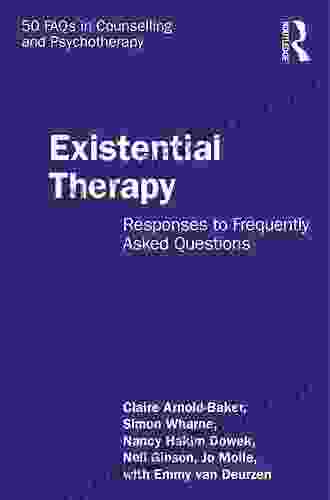Empowering Clients: Responses to Frequently Asked Questions in Counselling and Psychotherapy

Counselling and psychotherapy are indispensable tools for individuals seeking support and guidance in navigating life's challenges. Engage with clients effectively requires counsellors and psychotherapists to address their frequently asked questions (FAQs) with empathy, clarity, and professionalism. This comprehensive guide provides responses to 50 commonly encountered FAQs, empowering clients with the knowledge they need to embark on their therapeutic journey with confidence.
FAQ 1: What is the difference between counselling and psychotherapy?
Counselling focuses on addressing short-term, specific issues, such as relationship conflicts, stress management, or career transitions. Psychotherapy delves deeper into underlying patterns and behaviours, exploring their impact on an individual's overall psychological well-being and life experiences.
4 out of 5
| Language | : | English |
| File size | : | 421 KB |
| Text-to-Speech | : | Enabled |
| Screen Reader | : | Supported |
| Enhanced typesetting | : | Enabled |
| Word Wise | : | Enabled |
| Print length | : | 192 pages |
FAQ 2: How do I know if I need counselling or psychotherapy?
Consider seeking professional help if you persistently experience emotional distress, difficulty coping with daily life, or patterns of behaviour that negatively impact your relationships and overall well-being.
FAQ 3: What are different types of counselling and psychotherapy?
Various approaches exist, including Cognitive Behavioral Therapy (CBT),Dialectical Behavior Therapy (DBT),Psychodynamic Therapy, Humanistic Therapy, and more. Your counsellor or psychotherapist will recommend the most appropriate approach based on your specific needs.
FAQ 4: How often should I attend therapy?
The frequency of sessions varies depending on your individual needs and the type of therapy you are pursuing. Weekly sessions are common, but your therapist will discuss the optimal schedule with you.
FAQ 5: How long does therapy typically last?
The duration of therapy is unique to each individual. Short-term counselling may conclude within a few months, while long-term psychotherapy can extend over several years.
FAQ 6: Can I quit therapy whenever I want?
Yes, you have the right to discontinue therapy at any time. However, it is crucial to discuss your decision with your therapist to ensure a smooth transition and prevent potential setbacks.
FAQ 7: What should I expect in my first therapy session?
During your initial session, you will have the opportunity to share your reasons for seeking therapy, explore your goals, and determine if the therapist is a good fit for you.
FAQ 8: How do I find a good counsellor or psychotherapist?
Seek recommendations from trusted sources, research online directories, and consider your specific needs and preferences when selecting a therapist.
FAQ 9: Can I bring a friend or family member to therapy?
While it may be beneficial in certain situations, the decision of whether to involve others in therapy is best made in consultation with your therapist.
FAQ 10: Will my therapy sessions be kept confidential?
Confidentiality is of utmost importance. Your therapist is obligated to maintain the privacy of your sessions, with limited exceptions mandated by law.
FAQ 11: How can I make the most of therapy?
Actively participate in sessions, be open and honest, complete any assignments, and practice self-reflection outside of therapy.
FAQ 12: What if I don't feel comfortable with my therapist?
It is essential to feel comfortable and respected in therapy. If you experience any discomfort, discuss your concerns with your therapist or consider seeking a different one.
FAQ 13: Is it normal to have setbacks during therapy?
Setbacks are a common part of the therapeutic process. View them as opportunities for growth and learning, and collaborate with your therapist to navigate challenges effectively.
FAQ 14: What if I can't afford therapy?
Explore sliding scale fees, community mental health centres, or consider online therapy platforms that may offer more affordable options.
FAQ 15: Can therapy help me with [specific issue]?
Therapy can address a wide range of issues, including anxiety, depression, trauma, relationship problems, and more. Discuss your specific concerns with your therapist to explore how therapy can support you.
FAQ 16: What are the benefits of group therapy?
Group therapy offers opportunities for shared experiences, support from peers, and learning from the perspectives of others.
FAQ 17: How can I manage therapy between sessions?
Practice relaxation techniques, journal about your thoughts and feelings, and engage in self-care activities that support your overall well-being.
FAQ 18: What is transference and countertransference?
Transference occurs when clients project feelings or experiences from past relationships onto their therapist. Countertransference refers to the therapist's emotional responses to the client. These phenomena can be explored within the therapeutic relationship to facilitate growth and understanding.
FAQ 19: How do I know when therapy is working?
Signs of progress may include improvements in your mood, relationships, coping skills, and overall sense of well-being.
FAQ 20: How do I end therapy?
Discuss your decision with your therapist to plan a gradual and supportive transition off therapy.
FAQ 21: What if I experience a crisis outside of therapy hours?
Discuss with your therapist about establishing a crisis plan, including contact information for support services or emergency hotlines.
FAQ 22: How can I support a friend or family member who is in therapy?
Be empathetic, offer practical help, respect their boundaries, and encourage them to continue seeking professional support.
FAQ 23: What are the ethical guidelines for counsellors and psychotherapists?
Therapists adhere to ethical codes that prioritize client confidentiality, informed consent, non-discrimination, and maintaining professional boundaries.
FAQ 24: Can therapy be harmful?
Unprofessional or unethical practices can cause harm. Choose licensed and experienced therapists who prioritize client well-being.
FAQ 25: What are the different types of therapy for children and adolescents?
Play therapy, cognitive-behavioral therapy, and family therapy are among the approaches used for children and adolescents.
FAQ 26: How can I find a therapist who specializes in working with [specific population or issue]?
Research online directories, consult with your physician, or seek recommendations from trusted sources.
FAQ 27: What are the signs of a good therapist?
Look for warmth, empathy, active listening skills, and a collaborative approach.
FAQ 28: How can I prepare for my first therapy session?
Reflect on your reasons for seeking therapy, gather relevant information, and come with an open mind.
FAQ 29: What are the different therapeutic techniques?
Therapists use a variety of techniques tailored to individual needs, such as talk therapy, mindfulness, and exposure therapy.
FAQ 30: How long does it take to see results from therapy?
Progress varies, but consistency, active participation, and an open mind contribute to positive outcomes.
FAQ 31: Can I use therapy to improve my relationships?
Therapy can enhance communication, conflict resolution, and overall relationship dynamics.
FAQ 32: How can I find a therapist
4 out of 5
| Language | : | English |
| File size | : | 421 KB |
| Text-to-Speech | : | Enabled |
| Screen Reader | : | Supported |
| Enhanced typesetting | : | Enabled |
| Word Wise | : | Enabled |
| Print length | : | 192 pages |
Do you want to contribute by writing guest posts on this blog?
Please contact us and send us a resume of previous articles that you have written.
 Novel
Novel Page
Page Text
Text Story
Story Genre
Genre Reader
Reader Library
Library Newspaper
Newspaper Paragraph
Paragraph Sentence
Sentence Bookmark
Bookmark Bibliography
Bibliography Synopsis
Synopsis Footnote
Footnote Codex
Codex Bestseller
Bestseller Narrative
Narrative Autobiography
Autobiography Memoir
Memoir Thesaurus
Thesaurus Character
Character Librarian
Librarian Card Catalog
Card Catalog Borrowing
Borrowing Stacks
Stacks Archives
Archives Periodicals
Periodicals Study
Study Scholarly
Scholarly Lending
Lending Reserve
Reserve Journals
Journals Reading Room
Reading Room Special Collections
Special Collections Literacy
Literacy Study Group
Study Group Storytelling
Storytelling Awards
Awards Theory
Theory Textbooks
Textbooks Kevin Durant
Kevin Durant Windy Dryden
Windy Dryden Margot Scott
Margot Scott Isabel Allende
Isabel Allende Matthew Rahaim
Matthew Rahaim Sally Rose
Sally Rose Peter M Prendergast
Peter M Prendergast C B Andersen
C B Andersen Tom Demichael
Tom Demichael Tom Big Al Schreiter
Tom Big Al Schreiter Sven Kuehbauch
Sven Kuehbauch Sharon Sobel
Sharon Sobel James Carron
James Carron J P Singh
J P Singh Nikki Walker
Nikki Walker Ernest Poole
Ernest Poole Delores Fossen
Delores Fossen Steven Dos Santos
Steven Dos Santos Fred Emery
Fred Emery Michael S Sitrick
Michael S Sitrick
Light bulbAdvertise smarter! Our strategic ad space ensures maximum exposure. Reserve your spot today!

 Harold PowellCreate Better Connections, Invite with Ease, Obliterate Objections, Follow Up...
Harold PowellCreate Better Connections, Invite with Ease, Obliterate Objections, Follow Up... Colton CarterFollow ·3.4k
Colton CarterFollow ·3.4k Allen ParkerFollow ·19k
Allen ParkerFollow ·19k John UpdikeFollow ·18.8k
John UpdikeFollow ·18.8k Brayden ReedFollow ·16.9k
Brayden ReedFollow ·16.9k Yukio MishimaFollow ·19.2k
Yukio MishimaFollow ·19.2k Earl WilliamsFollow ·9.2k
Earl WilliamsFollow ·9.2k Ernest PowellFollow ·18.6k
Ernest PowellFollow ·18.6k Neil ParkerFollow ·19.1k
Neil ParkerFollow ·19.1k

 Matt Reed
Matt ReedTrekking the Breathtaking Scotland Coast to Coast Trail:...
Lace up your...

 Deacon Bell
Deacon BellThe Easy Guide to Playing Piano Scales: Piano Lessons for...
Piano scales...

 Fred Foster
Fred FosterUnveiling the Enthralling Best Friends to Lovers Romance...
Westbury Warriors: Where Love...

 T.S. Eliot
T.S. EliotHow To Dramatically Increase Your Profits And Sales...
Are you looking...

 Aaron Brooks
Aaron BrooksSummer at Stallion Ridge by Delores Fossen: A Thrilling...
Immerse Yourself in the...
4 out of 5
| Language | : | English |
| File size | : | 421 KB |
| Text-to-Speech | : | Enabled |
| Screen Reader | : | Supported |
| Enhanced typesetting | : | Enabled |
| Word Wise | : | Enabled |
| Print length | : | 192 pages |











